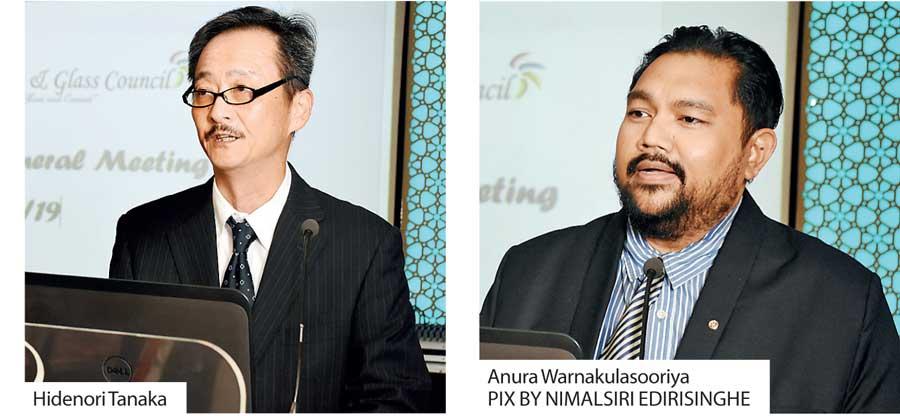25 Nov 2019 - {{hitsCtrl.values.hits}}

By Nishel Fernando
Sri Lanka’s ceramic industry is seeking the support of the new government to locally source raw materials for high value-added exports amid the country’s only refined kaolin production plant being recently shut down amidst lack of clarity in policies.
“There is enormous potential for Sri Lanka to export high-quality ceramic products to the global market but it needs to overcome some of the challenges facing the industry,” Noritake Lanka Porcelain (Pvt.) Ltd Chairman/Managing Director Hidenori Tanaka said.
He was speaking at the 16th Annual General Meeting of the Sri Lanka Ceramics and Glass Council (SLCGC), held in Colombo, last Thursday.
In particular, the newly-elected SLCGC President Anura Warnakulasooriya highlighted that the industry is forced to import around 100 tonnes of kaolin each month for ceramic products, although there are abundant kaolin deposits in the Meetiyagoda area in Ambalangoda.
He noted that Sri Lankan produced ceramics are at a disadvantage position in the international market due to the high cost of production arising from costly kaolin imports.
In recent years, Sri Lanka’s ceramic industry abandoned purchasing kaolin locally as the whiteness of locally refined kaolin was not on par with the international standards.
Lanka Ceramic PLC, which owns Sri Lanka’s only refined kaolin production plant, attempted to upgrade its refining process with Chinese technology to increase the whiteness of its product with around Rs.150 million investments.
The firm also sought the approval from the government to export kaolin as a value-added mineral to recover its investments initially, until the local demand is stabilised.
However, a senior official of Lanka Ceramic told Mirror Business that the Environment Ministry held up the necessary approvals for the project to move ahead without citing any reasons for the past five to six months while the Geological Survey and Mines Bureau (GSMB) approved the project.
“As kaolin exports are currently banned in Sri Lanka, we sought the approval from the GSMB to export kaolin as a value-added mineral after treatments. They approved our proposal and put it forward to the approval of the Environment Ministry.
However, the ministry has held up our proposal during the past five to six months. Therefore, we had no option but to abandon our plans and to shut down the plant,” he said.
Lanka Tiles has ceased refining operations, limiting its operations to mining and supplying of raw clay at its plant in Meetiyagoda without processing.
The official pointed out that the ceramic producers would have been able to save a minimum of 25 percent in sourcing kaolin, if their proposal to upgrade their refining process was approved by the authorities.
Sri Lanka currently imports refined kaolin from countries such as New Zealand, China, India and Bulgaria.
Further, there are several restrictions in acquiring mining licences, which have further impeded opportunities to exploit rare minerals such as kaolin for high value-added exports.
For example, the industry players point out that permits are required from 16 different agencies, making it almost impossible to mine for raw materials.
Warnakulasooriya noted that the ceramic industry’s value addition exceeds 300 percent on locally sourced raw materials.
Sri Lankan porcelain products are well known for its comparatively superior characteristics, including a high level of whiteness, high translucency, high scratch resistance and high thermal shock.
The country exports a wide product range of porcelain tableware, glazed wall and floor tiles and ornamental and utility ware, including figurines, decorations, kitchen utensils, bathroom accessories and studio pottery.
Sri Lanka also manufactures products for reputed international licensors such as Walt Disney, Universal Studios, Lucas Arts, Warner Bros and Walmart.
15 Nov 2024 49 minute ago
15 Nov 2024 3 hours ago
15 Nov 2024 3 hours ago
15 Nov 2024 3 hours ago
15 Nov 2024 3 hours ago